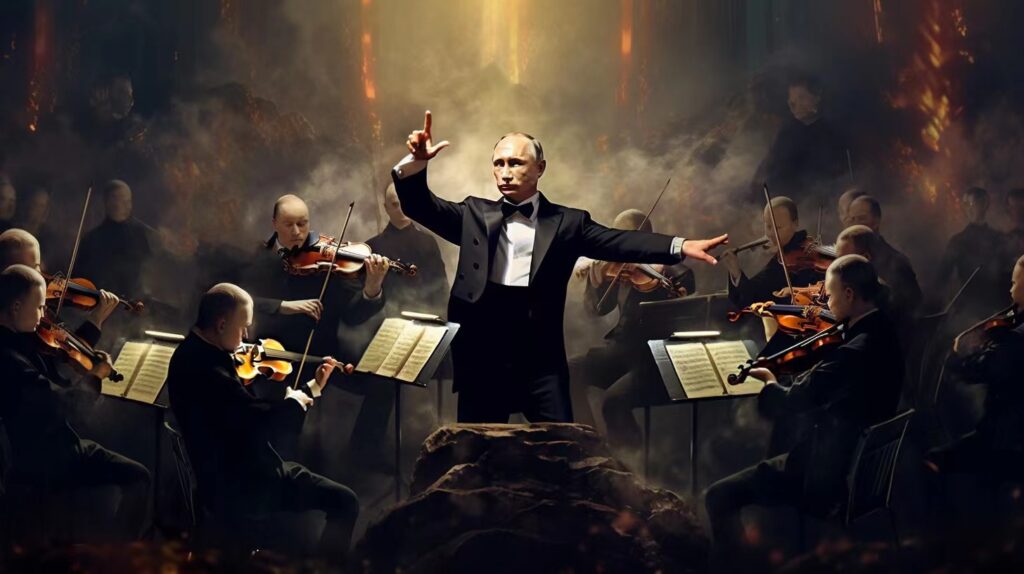Putin has amplified his connection to the classical music world over the past year. As the horrors of the Ukrainian war come to light, with the International Criminal Court issuing an arrest warrant for Putin in March, the Russian president has sought to cleanse his image through the respected art form. Paradoxically, Putin has also intensified a war within Russia: a war on its classical musicians.
The autocrat has always publicised his ties with musicians. Cellist and People’s Artist of Russia, Sergei Roldugin, is one of the musical associates Putin has used over the years. In 2016, after Russia invaded Syria on behalf of Bashar al-Assad, Putin flew Roldugin out to the recently bombed ancient ruins of Palmyra. The cellist performed three Soviet-era pieces by Rodion Shchedrin in the city’s 2,500-year-old amphitheatre.
Putin’s attempts to music-wash his wars do not end there. According to musicologist and former BBC broadcaster, Gerard McBurney, Putin has exploited his link with classical music even more since his invasion of Ukraine.
Read: ‘I can use my violin like a weapon’
Read more from our global voices here
“Since the war, Putin’s minions have gathered around a chorus of classical musicians who are prepared to speak up for him,” says McBurney. He says musicians like Roldugin and the former chief conductor of the Munich Philharmonic, Valery Gergiev, appear on state television claiming: “We are the greatest country in the world and we need to get rid of all foreign influences.”
The president put his name to the first classical music festival in Sochi in 2022. State media played Swan Lake during a Putin speech on the illegal referendums in Ukraine. What’s more, since the invasion, Putin has pushed his people to listen to Russian classical music instead of Western rock, because, in his words, “rock will not leave its mark on history”.
The Russian president has also moulded the arts to help feed his nationalist narrative. A Putin-led national festival, held this March, that celebrated Sergei Rachmaninoff’s 150th birthday is a good example of this, according to prize-winning Russian pianist Konstantin Lapshin. “Rachmaninoff’s Piano Concerto No.3 and Preludes are a kind of celebration of Russia,” says Lapshin – exactly the kind of music Putin is trying to promote.
Rachmaninoff fled Russia in 1917 and denounced the Soviet Union after the Revolution, a fact Putin has failed to ever make any mention of. Simon Morrison, a musicologist at Princeton University and author of Russian Opera and the Symbolist Movement, says this distortion of cultural icons is nothing new. Putin, like his Soviet predecessors, “is constantly repurposing stories of the past to justify what is happening in the present.”
Read: Dovetail: the orchestra of asylum seekers creating a community beyond music
Read more from our global voices here
Morrison says distorting historical figures to fit in with the narrative of Russian cultural supremacy is an easy way to promote Russia and put down foes. Over the past year, those foes have increasingly become Ukraine and the West.
By putting on lavish classical music festivals and pushing the Russian population to listen to Rimsky-Korsakov instead of the Rolling Stones, Morrison believes Putin is saying: “We are the place in the world that conserves civilisation and the classics, while the West are busy with hacking, groping and being woke.” McBurney says this rhetoric rings even truer when iconically British institutions, like the BBC, are proposing ever-harsher budget cuts to their orchestras.
With some Russian classical musicians and music blacklisted in the UK soon after the invasion of Ukraine, Morrison says another narrative can be spun: “Putin can say, ‘Look at all the people in the West that want to ban Tchaikovsky and our classical musicians. We don’t want to ban Shakespeare’.”
Despite the rhetoric, it is hard to argue Putin is a true bastion of classical music. The president is on a mission to shut down projects that are not in line with his “quasi-facist ideology,” says McBurney. In April last year, a concert in Moscow was shut down by riot police because the Russian pianist Alexei Lyubimov performed works by a Ukrainian composer. This April, the Bolshoi theatre was forced to drop a contemporary ballet because it “promoted” homosexuality, which went against Putin’s orthodox-backed nationalist agenda.
Read: ‘Diversity drives excellence’: the fight for fair music education
Read more from our global voices here
In May, Lev Dodin, chief director of one of St. Petersburg’s most renowned theatres, arrived at his workplace to find it sealed by Putin’s police. Doden was an outspoken critic of the war and had openly condemned the “rockets of hatred” fired by his country’s military. “It certainly has got a lot tougher for artists,” says McBurney.
However, there still remain pockets of hope. McBurney praises musicians like Alexander Malofeev, who are resisting Putin’s oppression. Malofeev often returns to Russia and still includes Ukrainian music in his programmes. Ukrainian activist and classical musician, Valentin Silvestrov, also continues to perform around Europe, giving his home country a wider platform.
Lapshin, who has been teaching at the Royal College of Music for over a decade, continues to defy convention. Soon after the invasion started, he performed with the Ukrainian baritone Yuriy Yurchuk at a Fight for Ukraine event. “The round of applause was huge. You may think Russians are the aggressor against Ukraine but we [musicians] are one big family. Performing together is how it should be. We can at least do this.”

